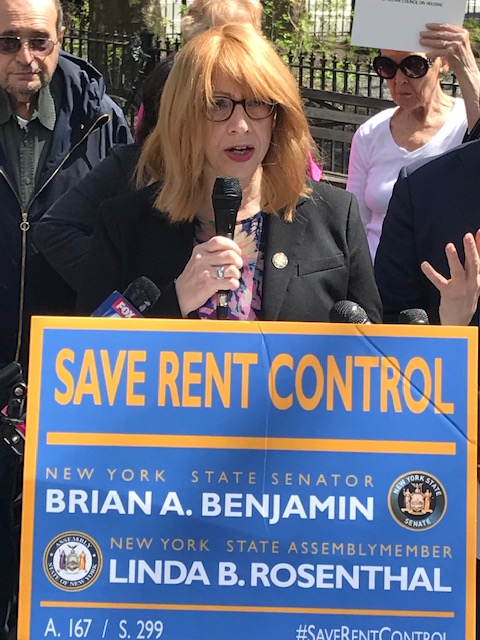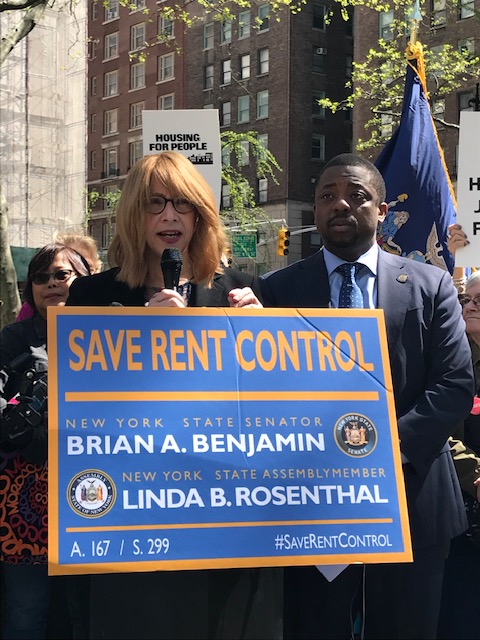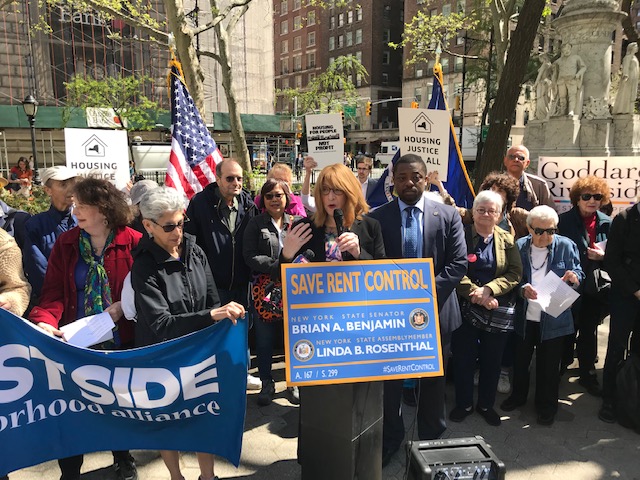Assemblymember Linda B. Rosenthal, State Senator Brian Benjamin, Tenants and Advocates Rally to #SaveRentControl
New York, NY – Assemblymember Linda B. Rosenthal (D/WF-Manhattan) and State Senator Brian Benjamin were joined by affordable housing advocates from Housing Conservation Coordinators, Goddard Riverside, Tenants and Neighbors, Met Council on Housing and rent-controlled tenants at a press conference and rally to highlight to distinct plight of rent-controlled tenants and to #SaveRentControl. With the rent laws set to expire in eight weeks, the coalition is pushing to ensure that rent-controlled tenants get desperately needed relief from sky-high biannual rent increases.
“Rent-control tenants are among New York’s most vulnerable – the vast majority are elderly and they live on low, fixed incomes. Their Social Security check has never increased by 7.5%, yet their rent does every other year, regardless of their ability to pay,” says Assemblymember Linda B. Rosenthal. “The MBR has been uniquely cruel to rent-controlled tenants, and we have a responsibility to provide the few that are left with relief now.”
“Many of the tenants of rent controlled apartments are seniors living on fixed incomes. The massive rent increases they are currently subject to are in and of themselves a housing crisis. There is no reason why rent-controlled apartments should be treated differently from rent-stabilized apartments. I am proud to have joined Assemblymember Linda B. Rosenthal as the Senate Sponsor of the bill to create this parity and preserve a vital part of our affordable housing stock,” said State Senator Brian Benjamin.
Rosenthal and Benjamin are sponsors of bill A.167/S.299, legislation to reform the way that rent increases are calculated for rent-controlled tenants. Instead of calculating rent increases using the archaic maximum base rent (MBR) system, which results in automatic biannual 7.5% rent increases, rent increases for rent-controlled tenants would be calculated by taking the average of the previous five years rent increases for one-year leases for rent-stabilized tenants.
"It's not complicated – a 7.5 % yearly rent increase is unsustainable – simple. Compound this with the unconscionable MCI increases that are clearly designed to push people out and we see that New York City is faced with a senior population living in fear,” said Robin Davignon, Queens tenant and member of the Zara Tenant Coalition.
In addition, the bill would eliminate the fuel pass-a-long. Though the MBR formula factors fuel costs into the calculation, rent-controlled tenants are required to pay an additional monthly charge for fuel.
The population of rent-controlled tenants has gradually but precipitously dropped. New York has lost more than 17,000 units of rent-controlled housing since 2011. Today, there are just a little more than 21,000 rent-controlled units citywide.
“Many rent-controlled tenants in my West Side district moved in before the West Side was an attractive place for people to live, work and raise families. These people built our community, and now in their golden years, they cannot afford to live in it. We owe them more,” said Assemblymember Linda B. Rosenthal.
Rent-controlled tenants are the only group of tenants as a class whose income decreased – 5% between 2013 and 2016 – yet their rent increased by at least 7.5% in the same time period.
“The overwhelming majority of rent-controlled tenants in New York City simply cannot afford a 7.5% rent increase every year,” said Regina Ryan, a rent controlled tenant affiliated with the West Side Neighborhood Alliance. “These tenants are mainly older women living on a fixed income and paying nearly 35% of their income in rent. The current system does not speak to this inequity and I am glad to see legislation that will hopefully get at the heart of this issue.”
Some rent-controlled tenants are eligible to have their rent frozen via the Senior Citizen Rent Increase Exemption (SCRIE) program, which freezes the rent of eligible tenants over the age of 50, live in qualifying rent-regulated or other housing, have an annual income of $50,000 and pay a third or more of their income toward their rent. Despite this, because the income limits were not increased to $50,000 from a low $29,000 until 2014, many rent-controlled tenants were already paying untenably high rents by that time.
The rent laws expire on June 15th, and affordable housing advocates are calling for the passage of a broad package of tenant protection legislation including:
1. S2591/A1198 – the bill to end vacancy deregulation
2. S5040/A7046 – to remove geographic restrictions in the Emergency Tenant Protection Act (ETPA)
3. S2892/A5030 – “Good cause” eviction legislation to bring renters rights to tenants in smaller buildings and in manufactured home communities
4. S2845A/A4349 – to make preferential rents permanent
5. S185/A2351 – to eliminate the vacancy bonus
6. S3693/A6322 – to eliminate permanent rent hikes caused by major capital improvements
7. S3770/A6465 – to eliminate individual apartment increases
8. S299A/A167 – to create relief for rent-controlled tenants
9. A5251/S4169 – to reform the four-year look back rule
The terms rent control and rent stabilization are often used interchangeably, and it is vital that legislators and the public recognize that rent-controlled tenants are a separate group of vulnerable tenants in need of very specific rent relief.
"We rent-controlled tenants have waited many years for the passage of this bill. We have supported Assemblymember Linda Rosenthal's efforts and hard work for its passage. We need the relief from high increases and the elimination of the other injustices," said Norma Schreier, a rent-controlled tenant living on the Upper West Side since 1962.
Assemblymember Linda B. Rosenthal is the Chair of the Committee on Alcoholism and Drug Abuse. She is the sponsor of the bill to repeal vacancy deregulation. Rosenthal represents the 67th Assembly district, which includes the Upper West Side and Hell’s Kitchen neighborhoods in Manhattan.
Senator Benjamin represents Harlem, East Harlem, and the Upper West Side. He is the Senior Assistant Majority Leader and chair of the committee on Revenues and Budget.



